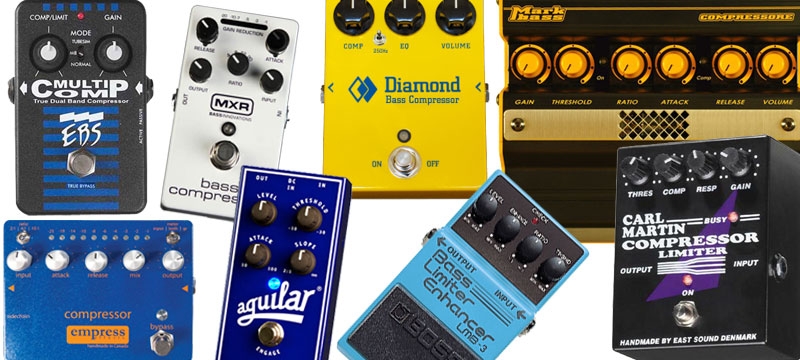This is a little guide to introduce Compressor / Limiter from a bass player’s point of view.
Unlike other type of guitar/bass effects such as distortion, modulation(chorus, flanger), delay, reverb. Dynamic effects such as Compressor, Limiter, Expander, and Gate change the signal’s dynamic range (amplitudes) and very often beginners have hard time hearing how their sound is being altered. This guide covers basic information on main compressions, in a less technical form.
Fact: Compressor and Limiter work in the same behavior, only difference is the compression Ratio.
A few basic elements on a compressor are: Threshold, Ratio, Speed (Attack/Release), and Makeup Gain(Gain). When the level of the input signal(your bass) pass the threshold, the compressor starts to attenuate(cut, bring down) the signal based on the preset Ratio.
An example of how compressor work:
While you are sitting in front of the speakers, listening to the music of your choice, and the chorus of the song gets too loud. The action to take is to bring down the volume. When the loud chorus is over, you bring back the overall volume again to where it was.
In this case:
Threshold – Your ear, who decides when the music gets too loud.
Ratio – The amount of volume you brought down
Attack – The time it took from the moment you think the music is too loud to your hand reach(and turn down) the volume knob.
Release – The time it took from the moment the chorus is over to your hand reach(and turn up) the volume knob again.
The concept of compressor/limiter is to attenuate the volume, Makeup Gain is being used to bring up the overall level of the signal so we don’t lose much volume when the compression is engaged. It also brings up the signal that’s no being processed. The end result will be making the quiet signal louder, and loud signal quieter to reach a more smooth overall signal level. It also brings up the details in the signal to make the signal bigger and fatter.
Limiter is a compressor with high to extreme compression ratio. The ratio could be anywhere from 10:1, to 20:1 or to ∞:1 (∞:1 is at around 60:1 on many processors), and it’s very often set to a very fast working speed(attack/release). It’s being used mainly for broadcasting, or some musician uses it to protect their high-end tube amplifiers by catching/blocking some unwanted spikes. When comparing with a compressor, limiter is less responsive.
A compressor in an ideal setting makes each note fat, big and balance, the right speed makes the notes pumping and pushing. People call it the character that drives the music.
Most of the products in the market are pretty good when it comes to choosing a compressor for bass. It’s harder to find a bad sounding one in these days, and there are tons of good review on bass compressors all over the internet.
Very often, beginner can’t really tell how a compressor work, or they don’t know the things the heard is compression. I spent quiet a few years to learn how to listen to one.
My general method of setting a compressor would be setting all the knobs at 12 o’clock position, don’t add any gain yet. First with the compressor off, flip around between a fretted note and a mute note(can be just a low A on the E string), and pay attention to the difference in volume between the mute and fretted notes. Then, turn on the compressor and see if the difference changed. Turn the threshold to extreme left and right to hear the difference between the notes. The goal is to make sure you hear the compressor sucking the volume. Once you hear that, then turn the threshold back to 12 o’clock and adjust from there. Keep turning the threshold(ratio at around 3:1 to 4:1), by the time the volume of the mute note is somewhere near the fretted note without plucking the string hard then that’s a good point to start with.
And now you can mess around with the effect to find the settings you like.
Conclusion:
Compressor is like the distortion pedal for bass player, it’s very useful for many many kind of music especially for rock and heavy stuffs, and for people who like to slap a lot as it helps to keep the note loud and consistent. However, it is NOT a must to have, and very often people over the internet made it mystery. All the tone and dynamic come from your hand. It also brings up the flaws in your playing. Bass player without a compressor won’t die.
